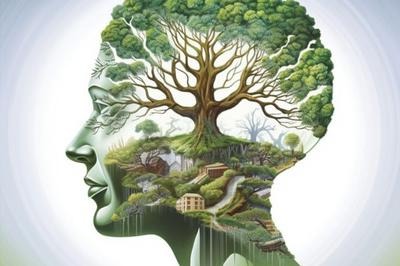Eco-psychology: How Nature Heals
Eco-psychology suggests that an optimistic attitude and hope can be found in the realization that humans are not separate from nature but an integral part of the biosphere.


Eco-psychology, as the name suggests, is an interdisciplinary field that focuses on the synthesis of two distinct disciplines, namely, ecology and psychology with an emphasis on individual well-being and environmental sustainability. It is different from conventional branches of psychology as it focuses on the emotional connection between human beings and nature. It studies the symbiotic relationship between humans and the natural environment using both ecological and psychological principles.
According to Dr. Rakheebrita Biswas, “Ecopsychology explores humans' psychological interdependence with the nature or environment he/she deals with and the implications for identity, health and well-being. Thus the topics or areas of Ecopsychology include emotional responses to nature or surroundings; the impacts and consequences of environmental issues such as natural disasters, global climate change, and the transpersonal dimensions of environmental identity and concern as well.”
Like all fields of study and research, eco-psychology has technical terms that are specific to it. Certain important terms and concepts in eco-psychology include Biophilia, which refers to the innate human tendency to seek closeness and connection with the natural environment. Another term that is frequently used in this field is Nature-deficit disorder, which connotes the pathological effects of not spending enough time in nature.
Another key principle in eco-psychology is the concept of Solastalgia, which connotes the intense emotional pain and turmoil caused by environmental degradation that might be an aftereffect of man-made or natural causes. Also referred to as Ecological grief, this condition is a psychological response often developed in humans who witness the loss or exploitation of nature and natural resources.
Eco-psychology offers many practical applications such as Nature-based therapy that focuses on healing trauma through engaging in outdoor activities such as gardening, hiking, or foraging that re-establish the individual’s connection with nature. Moreover, this field opens up possibilities for sustainable development that channels and utilizes the human affinity towards the natural environment for the conservation of nature and adopting sustainable practices like reducing fossil fuel consumption, using renewable energy, and switching to a plant-based lifestyle.
In this manner, eco-psychology offers a message of hope and comfort. By reconnecting with nature and recognizing our place within the natural world, individuals and communities can retain a sense of belonging and cultivate a notion of meaning and purpose.
Eco-psychology suggests that an optimistic attitude and hope can be found in the realization that humans are not separate from nature but an integral part of the natural world, otherwise called the biosphere. This recognition can also aid in humans taking efforts to protect the planet Earth and its natural environment, which is indeed the true and only home for all.
References
https://ecopsychology.info/what-is-ecopsychology/
https://e360.yale.edu/features/ecopsychology-how-immersion-in-nature-benefits-your-health
